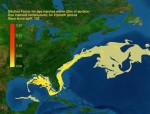
The oil spill in the Gulf of Mexico, which first began almost two months ago, has been deemed the worse oil disaster in American history.
The damage and expenses that have accumulated during the past weeks surpasses every previous oil related disaster. Because of the speed and quantity of oil gushing into the ocean, North Carolina’s coast is in danger of experiencing significant economic and environmental damage. The Gulf Stream flows up the nation’s coastline, if the oil spill reaches the stream the damage will be carried onto North Carolina beaches.
Lt. Shannon Scaff of the United States Coast Guard assures North Carolina citizens: “The state is prepared. We’re watching i5 closely, we’re taking it seriously.”
Scaff admits that where the oil spill will reach or even if it will spread to North Carolina is unpredictable but is adamant in reassuring the public that the Coast Guard is working with the the National Oceanic and Atmospheric Association (NOAA) and state officials to constantly monitor the loop current around Florida for any signs that the Gulf Stream will carry the oil to North Carolina.
In anticipation for the worst, North Carolina has eight units of the Coast Guard who continuously patrol the coast equipped with plenty of resources and man-power to spring into action in the event that oil reaches our coast.
The NCEOP, North Carolina Emergency Operations Plan, establishes a coordinated, effective, systematic plan to respond and recover from disasters. The plan that is on reserve to be implemented in case of an emergency assigns responsibility to designated federal and state organizations and establishes various plans of action for different emergency levels. The plan is intended to organize and increase response time and effectiveness in case the oil reaches our coast.
Western Carolina University’s PSDS, Program for the Study of Developed Shorelines, has been playing an active role in establishing a plan to reduce the damage to coastal communities. PSDS is a program known internationally for their ability to implement science alongside existing public policies in the management of shorelines all over the world.
WCU is lending their PSDS scientist to better assess the damage and establish a game plan.
Rob Young, Director of PSDS, said, “So far we have conducted two aerial reconnaissance surveys of the area that is being affected by this environmental disaster, in addition, scientists from the program have been working on the ground in costal Louisiana to assess the impact.”
Young, and other scientist are worried that some of the proposed solutions may result in further damage to the environment while attempting to prevent it. Scientists from WCU have visited the Gulf Coast three times since the oil began gushing into the ocean; Research Scientist and WCU graduate Adam Griffith described his reaction after visiting the Gulf Coast as being “horrified.”
Young recalled, “Oil in large pools was evident on the beach. Hermit crabs wandered around next to bubbles of oil while dolphins frolicked in water that wasn’t quite the right color. Foul fumes were everywhere and oil could be seen oozing out of the wetlands.”
The upcoming weeks are promised to be challenging for our entire nation, fortunately, some comfort can be taken in knowing that our state is prepared to handle the oil spill if it reaches our coast and in knowing that WCU is working first hand to establish environmental and economic security for our nation in this time of need.






